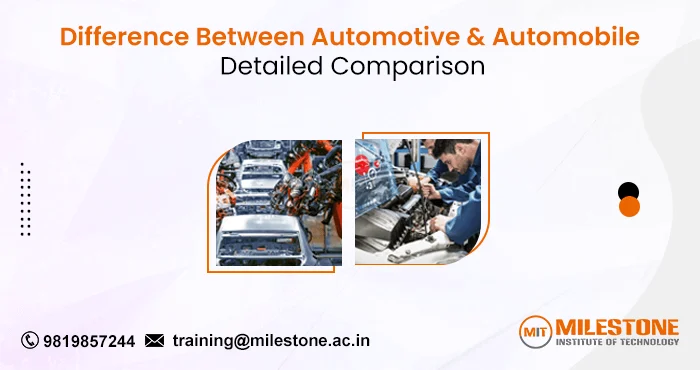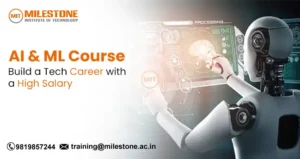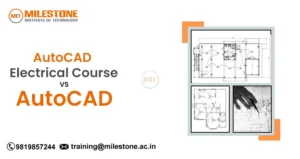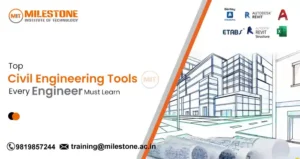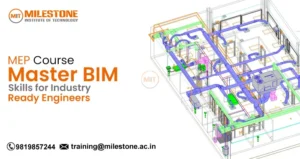In today’s developing world of engineering, there are most common terms “automotive” and “automobile” which are frequently used interchangeably but they have different meanings and applications. In this blog we will be clarifying their definitions, understand the
difference between automotive and automobile, debunk misconceptions, and many more. Let’s dive into details.
What is Automotive?
The term “automotive” broadly refers to everything related to motor vehicles and the industry that surrounds them. It encompasses the design, development, manufacturing, marketing, and maintenance of vehicles used primarily for transportation on roads. The
automotive industry is expansive and vital to global economies, influencing technological advancements, innovation in vehicle design, and infrastructure development.
What is Automobile?
The term “automobile,” however, particularly designates a self-propelled vehicle used for the transportation of individuals or goods. In common usage, it often refers to passenger cars designed primarily for personal transportation. Automobiles come in various types, including sedans, SUVs, trucks, and motorcycles, and they can be powered by different propulsion systems such as internal combustion engines (gasoline or diesel), electric motors, or hybrid systems.
Understand the Difference Between Automotive and Automobile (Automotive vs Automobile)
| Aspect |
Automotive |
Automobile |
| Definition |
Industry encompassing motor vehicle activities |
Self-propelled vehicle for transportation |
| Scope |
Broad, includes vehicles, parts, manufacturing |
Narrow, refers specifically to passenger cars |
| Industry Impact |
Influences technology, economy, infrastructure |
Drives consumer mobility, transportation |
| Examples |
Manufacturers, suppliers, dealerships |
Sedans, SUVs, trucks, motorcycles |
| Innovation Focus |
Vehicle design, safety, efficiency |
Comfort, performance, features |
Misconceptions about Automotive and Automobile
Misconception: Meaning of Automotive and automobile are the same thing.
Fact: While related, “automotive” refers to the industry, encompassing all aspects of motor vehicles, whereas “automobile” specifically refers to the vehicle itself, especially passenger cars.
Misconception: Electric vehicles are not part of the automotive industry.
Fact: Electric vehicles are integral to the automotive sector, representing a growing segment of vehicle manufacturing and innovation. They contribute significantly to the industry’s evolution towards sustainable mobility solutions.
Applications of Automotive and Automobile
Automotive Applications:
- Manufacturing: The automotive industry involves the production of vehicles and their components, including engines, chassis, and electronics. Manufacturers employ advanced manufacturing processes to ensure efficiency and quality.
- Technology: Continuous innovation in automotive technology drives advancements such as electric and hybrid vehicles, autonomous driving technologies, and connectivity features that enhance safety and convenience for users.
- Economy: The automotive sector is a significant contributor to global GDP, generating employment across manufacturing, sales, service, and related sectors. It influences economic growth through investments in infrastructure and technological research.
Automobile Applications:
- Personal Transportation: Automobiles serve as primary means of personal mobility, facilitating daily commuting, travel, and leisure activities for individuals and families.
- Commercial Use: Beyond personal use, automobiles support commercial activities such as goods transportation, delivery services, and ridesharing, contributing to logistics and urban mobility solutions.
- Urban Mobility: In urban areas, automobiles play a crucial role in addressing transportation challenges by providing flexible mobility options for residents and businesses.
What are the skills differences between automotive and automobile?
- 1) Automotive Industry Skills: The automotive industry demands a diverse set of skills, including:
- Engineering Expertise: Professionals need strong engineering skills to design and develop vehicles, including mechanical, electrical, and software engineering for modern technologies like electric and autonomous vehicles.
- Manufacturing Skills: Knowledge of advanced manufacturing processes, such as robotics and automation, is crucial for efficient and high-quality vehicle production.
- Research and Development: Innovation in automotive requires skills in research and development (R&D) to improve vehicle performance, safety features, and sustainability.
- Supply Chain Management: Managing the logistics and procurement of automotive materials and components requires an understanding of supply chain dynamics.
- 2) Automobile Sector Skills: In contrast, the automobile sector, focusing on vehicle operation and usage, emphasizes:
- Driving Skills: Proficiency in driving various types of automobiles, including knowledge of traffic laws and safe driving practices.
- Customer Service: Skills in customer interaction and service are vital, especially in roles such as sales, maintenance, and support in automobile dealerships.
- Technical Knowledge: Basic technical skills for troubleshooting and minor repairs, which are useful for vehicle owners and service technicians.
- Safety Awareness: Awareness of vehicle safety features and practices to ensure safe operation and maintenance of automobiles.
Overall, while the automotive industry requires specialized engineering and manufacturing skills for vehicle development and production, the automobile sector focuses more on practical skills related to vehicle operation, maintenance, and customer service.
Where Can You Learn Automotive and Automobile?
For those interested in pursuing careers or deepening their understanding of
automotive and automobile technologies, institutions like the Milestone Institute of Technology offer specialized educational programs. These programs cover various aspects of automotive engineering, vehicle design, manufacturing processes, and sustainable mobility solutions. Students benefit from hands-on training with modern equipment and industry-relevant projects, preparing them for careers in the dynamic automotive sector.
Frequently Asked Questions
What are the key trends in the automotive industry today?
Key trends include electric and autonomous vehicles, connected car technologies (IoT integration), and advancements in vehicle safety and efficiency.
How can I start a career in the automotive sector?
Start by pursuing relevant education in automotive engineering, mechanical engineering, or related fields. Gain practical experience through internships or apprenticeships with automotive companies. Individuals should also stay updated on technology developments and industry trends.
